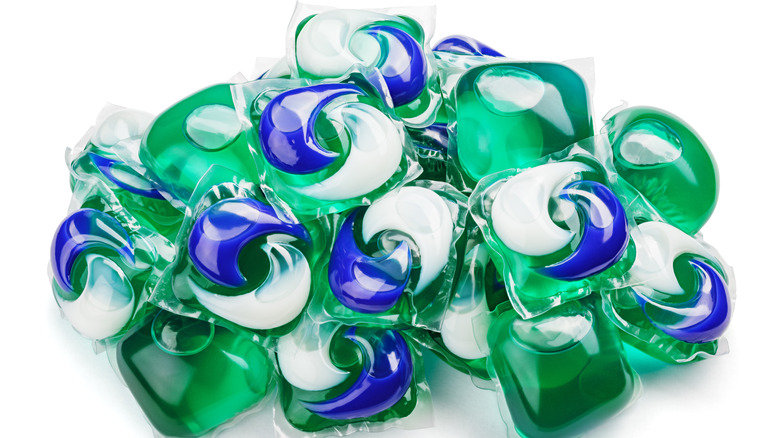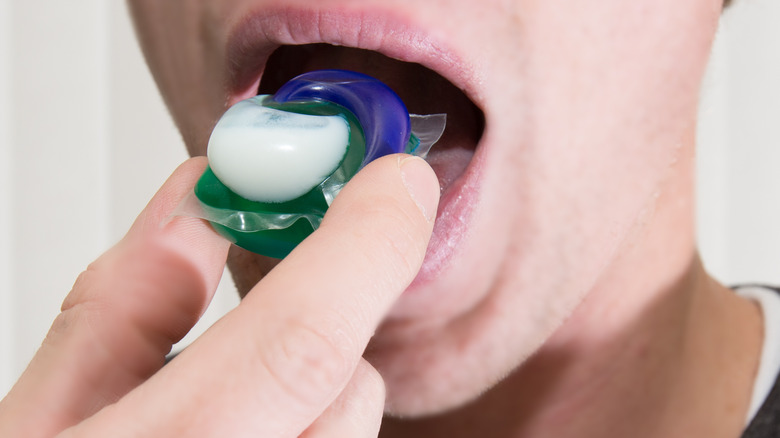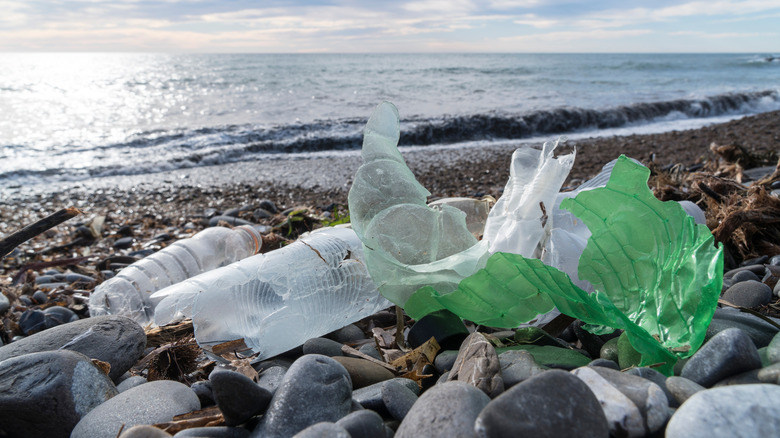Why You Should Stop Using Laundry Pods Immediately
Laundry pods, those convenient, pre-measured packets of laundry detergent, have become a household staple since Tide's version was introduced in 2012. Unfortunately, making clothes-washing easier has had unintended consequences. In spite of efforts to tackle the problems, laundry detergent pods continue to be a threat to consumers and the environment alike.
The colorful and squeezable capsules can be an irresistible lure for young children and have been mistaken for candy by the unsuspecting. Ignorant of the implications, a significant number have harmed themselves by putting the pods in their mouths and aspirating or ingesting the contents. According to the Cleveland Clinic, there were more than 50,000 such incidents over a five-year span. Kids 5 and under were the most common victims by far, but there were even episodes involving seniors. Lately, though, poisoning cases have decreased due to mitigation efforts and an uptick in public awareness.
Some of the harmful effects are relatively minor. However, extreme results include burns in the mouth, eyes, or lungs; esophagus or other gastrointestinal damage; dangerous drops in blood pressure; seizures; or loss of consciousness. Respiratory arrest is possible and death is a potential outcome. Laundry pods have thus earned a warning from the U.S. Consumer Product Safety Commission recognizing the dangers posed by them.
The problem with laundry detergent pods
Experts recommend keeping pods away from those with cognitive issues or children less than 5. Consumer Reports goes further and suggests age 6 as the cutoff. Note: They view powdered, single-use pods differently than those filled with liquid, as there have been far fewer and less disastrous incidents involving them.
Deliberate misuse of the potentially lethal pods has even occurred. Joining the ranks of other grotesque dares, some social media users have actually engineered stunts involving the laundry product. The so-called Tide Pod Challenge, as reported in The Washington Post, shares videos of participants biting into pods and then chewing them, with the predictable volcanic soap expulsion. Some even fry them before eating and taping.
Tide's parent company Procter & Gamble, which represents almost 15% of the global segment, has taken action. They produced a PSA warning against pod abuse. It features football star Rob Gronkowski and is aimed at this group of challengers. The company has also adopted some additional safety measures; they strengthened the pod's outer layer to thwart young children from ingesting the contents. They also added denatonium benzoate to the soap, an extremely bitter substance designed to make its flavor less appealing. Other safety-minded improvements include containers with stronger latches, see-through containers, and a TV commercial depicting a toddler reaching for a pod, only to have it snatched away by its watchful mother.
Detergent pods may contribute to plastic pollution
Last year, researchers at Arizona State University along with nonprofit Plastic Oceans conducted a study of detergent pods. It focused on the deleterious environmental effects of their outer shell. Consisting of polyvinyl alcohol (PVA), the coating actually turns into a plastic solution when exposed to water. It may not be completely biodegradable, as has been claimed by the industry. In fact, the team calculated that up to 3/4 of the PVA from laundry pods (8,000 metric tons worth) conceivably enters U.S. aquatic ecosystems every year. Chemical & Engineering News quotes the study and echoes its conclusions that the laundry detergent pods play a role in plastic pollution.
Manufacturers promote the product as an environmentally neutral choice, but that does not actually appear to fully ring true. And, given the other dangers potentially posed by laundry detergent pods, perhaps it is time to reconsider their use. Not only that, swapping them for traditional powder or liquid laundry detergents will even save you money at the cash register, per The Spruce.


